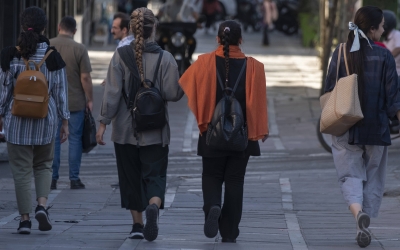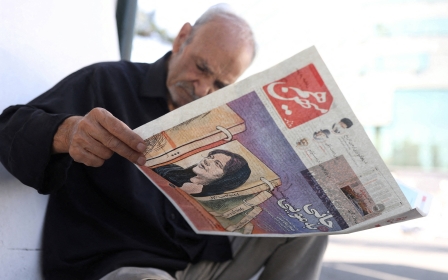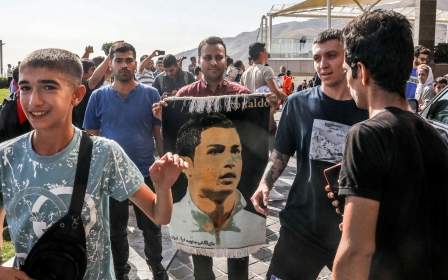Iranian press review: Curly hair banned for male medical students

List of new restrictions announced for students
At the beginning of the new academic year, Iran's health ministry published a list of new instructions for medical students, in which male students and physician assistants were banned from having curly hair.
These new restrictions were announced after a law passed by parliament on 20 September to impose harsher punishments on women defying the compulsory Islamic hijab and dress code.
On Monday, the Etemad Daily published the details of the health ministry's instructions, which oblige medical schools to grade students based on their compliance with the Islamic hijab law.
Most of the restrictions announced targeted women. However, two bans were explicitly for men: a "ban on having curly hair" and a "ban on wearing bracelets".
New MEE newsletter: Jerusalem Dispatch
Sign up to get the latest insights and analysis on Israel-Palestine, alongside Turkey Unpacked and other MEE newsletters
The daily reported that apart from covering the hair, other obligations were directed towards women, including a ban on putting on false eyelashes, having nail extensions, tucking trousers into boots, and wearing lace socks.
"Wearing clothes with printed images of women, love sentences, swearing, comic and meaningless pictures, anti-religious symbols, logos of rap, and heavy metal bands" were also prohibited in this directive.
The new order also forbade "having tattoos on the face (especially lips, eyebrows, and eye tattoos), on visible parts of the body (such as hands, face, and...), and piercing on body parts such as nose rings".
Indignation over better internet for foreigners
A decision by Iran's officials to offer "special SIM cards" to foreign tourists, enabling them to have unrestricted internet while visiting the country, has provoked anger among Iranians who encounter difficulties in accessing reliable internet.
On Sunday, Ali Asghar Shalbafan, a deputy at the tourism ministry, told ISNA news agency that "unrestricted tourism SIM cards" would be provided to foreign tourists.
The decision was made amid ongoing internet cutoffs since the anti-establishment protests that swept the country last September following the death of Mahsa Amini in police custody. At the same time, social media platforms and messaging applications such as Instagram and WhatsApp have been blocked.
The move received adverse reactions from the public and politicians, with many labelling it a "capitulation law".
On Monday, the Aftab daily criticised the decision under the headline, "Tourism SIM card or capitulation in simple words?"
"It's not right to offer extra convenience to others while Iranians lack basic internet access. Offering special deals to tourists is fine, but not at the expense of Iranian citizens' rights," wrote the daily.
Iranian lawmaker Moein-odin Saeedi also lambasted the government's decision, calling it "internet capitulation".
"How can they provide unrestricted access to social media for outsiders while millions of Iranians, who rely on these platforms for income, can't access the internet?" the ILNA news agency quoted him as saying.
Mothers hold 'childbearing jihad' march
Photos published by local media showing a large group of women in black chadors pushing children's strollers during an official military march in the central city of Yazd have sparked criticism and mockery among Iranians.
The photos were first published by the country's official news agency, IRNA, and the semi-governmental ISNA news agency. In the images, a small white flag with Farsi writing that read "childbearing jihad" was seen attached to each stroller.
Pro-establishment outlets, such as the Hamshahri daily, republished the photos, hailing the move as a landmark example of obedience to the country's supreme leader's demand to increase the birth rate.
In recent years, authorities in Iran have widely campaigned for increasing the country's population as a strategic policy to maintain dominance in the region. At the same time, officials have banned the free distribution of contraceptive products and prohibited voluntary sterilisations.
However, in response to the official outlets, ordinary Iranians took to Farsi social media to denounce the mothers' march as a form of child abuse.
"This country has over one million ready-to-fight soldiers to protect women and children from the battleground. This march with the strollers was a disrespect to a military march, a disrespect to mothers, and a disrespect to children's rights," one Iranian social media user wrote on X, formerly known as Twitter.
Meanwhile, some other Iranians used the occasion to ridicule Iranian officials' demographic policies and military shows.
"Apparently, the masters who cannot win any combat against the Taliban, Kuwait, Saudi Arabia, Turkey, Azerbaijan, and any other country decided to showcase the only successful combat they have had: the nocturnal hand-to-hand combat," wrote another X user.
* Iranian press review is a digest of news reports not independently verified as accurate by Middle East Eye.
Middle East Eye delivers independent and unrivalled coverage and analysis of the Middle East, North Africa and beyond. To learn more about republishing this content and the associated fees, please fill out this form. More about MEE can be found here.





